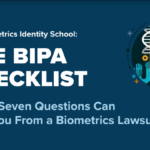Welcome to FindBiometrics’ digest of identity industry news. Here’s what you need to know about the world of digital identity and biometrics today:
Judge Finds BIPA’s Borders
A federal judge has tossed an almost identical pair of BIPA lawsuits against Amazon and Microsoft, largely over jurisdictional matters. The lawsuits alleged that the tech giants violated Illinois’s Biometric Information Privacy Act by sourcing a face image dataset from IBM that comprised 100 million photos uploaded by users to Flickr, a public photo-sharing site, without obtaining the users’ explicit consent. Judge James L. Robart of the US District Court for the Western District of Washington determined that the plaintiffs failed to demonstrate that the alleged misconduct occurred “primarily and substantially” in the state of Illinois.
Liberia Re-Selects Ekemp
Liberia’s National Elections Commission has once again chosen a consortium led by China-based Ekemp as the vendor for its biometric voter registration system, according to a report from FrontPageAfrica. And this time, the decision was reportedly made solely by Commission Chairperson Davidetta Brown Lansannah, and to the chagrin of other commissioners, some of whom characterized the move as an abuse of office. An initial round of bids for the project had seen signs of favoritism toward Ekemp, ultimately leading to a request for a do-over from Public Procurement Concession Commission. Ekemp had fumbled in its presentation during the second round of bidding, but accused the Commission panel of improperly disrupting its effort, and recently went so far as to file a complaint with Liberia’s Supreme Court last week.
A Rival to Clearview AI?
Indonesia-based Sentient Labs appears to have developed a rival to one of the most controversial face biometrics platforms in the market. Dubbed “FaceCheck”, Sentient Labs’ solution is billed as a “reverse image search” for faces, allowing end users to search an extensive database of images from social media profiles as well as websites and blogs; the search button on the platform’s website is labelled, “Search Internet by Face”. It’s a very similar premise to that of the facial recognition platform offered by US-based Clearview AI, which has run into privacy-focused legal obstacles in a number of jurisdictions. FaceCheck, for its part, invites individuals to submit a “Removal Request”.
TOTM Wins Law Enforcement Contract
TOTM Technologies has won a $5.4 million contract to provide an Indonesian law enforcement agency with biometric identification systems that are integrated with the country’s national ID database. The company expects to complete the project by the end of this year, and says the contract will contribute to its FY2023 financial performance. News of the deal comes just days after TOTM’s announcement of its acquisition of InterBIO. It is the second contract that TOTM has established with the unnamed law enforcement agency.
Anti-Car Theft Biometrics
Vancouver-based Park-Kit has launched a smart parking system with an innovative biometric anti-theft feature. The software is pitched primarily on the basis of its dynamic lighting system, which guides a driver entering a garage to an empty space. But it also supports a facial recognition feature that can be used to prevent a car from exiting a garage when the driver is different from the one who first brought the car in.
1Kosmos Gets SOC 2 Type II Certification
1Kosmos has obtained System and Organization Controls (SOC) 2 Type II certification, validating that the company maintains strong system level controls for its identity proofing and passwordless authentication platform. CEO Hemen Vimadalal commented that the certification offers “yet another measure of confidence that the BlockID platform has been externally audited and validated to meet the strictest industry standards for security, availability, and confidentiality.”
Backtracking on Bathroom Biometrics
Administrators at a high school in Sydney are backing down from a plan to install fingerprint readers at the school’s bathroom after receiving international media scrutiny. The school had been struggling with a vandalism problem that was costing thousands of dollars a year to clean up, and looked to biometric access control as a solution. Privacy activists weighed in, with Digital Rights Watch warning that “biometric surveillance” was being “trialled on children in schools”. A school spokesperson now says that administrators are “considering a range of options” and will consult the school community before implementing them.
Consumer Devices Roundup
- Dell’s XPS 13 laptop features a fingerprint sensor embedded in its power button, and supports facial recognition via Windows Hello.
- The Oppo A17k, a low-budget smartphone that just launched in India, features a side-mounted fingerprint sensor and support for facial recognition.
- Microsoft’s Surface Studio 2+ hybrid PC/tablet supports facial recognition via Windows Hello.
- The Simshine Baby Pro Monitor is a smart baby monitor device that features facial recognition and sleep tracking capabilities.
Facial Recognition for Problem Gamblers
ClubsNSW and Australian Hotels Association NSW are planning to deploy facial recognition systems at their gaming venues in order to automatically detect self-selected problem gamblers and flag them for expulsion. Another Australian operator, Star Entertainment Group, recently pledged to install more facial recognition cameras at its gaming facilities as part of a corporate overhaul intended to satisfy regulators. ClubsNSW and Australian Hotels Association NSW are aiming to implement their facial recognition systems next year.
Zero-COVID Hurts FPC Sales
Fingerprint Cards has revealed that it’s one of the many companies to have taken an economic hit from China’s ‘zero-COVID’ policy, which has seen government authorities implement draconian lockdowns in an effort to stop the spread of newer COVID-19 variants. In its latest corporate update, for Q3 of 2022, CEO Christian Fredrikson noted that such restrictions have contributed to a “sharp decline in demand for smartphones in China” – a serious problem for FPC, whose main business line has historically been the sale of fingerprint sensors for mobile devices. In Q3, those sales were down 37 percent compared to Q2, and they were down 60 percent year-over-year. A slowdown in the country’s construction sector. That having been said, FPC has seen growth in areas outside of mobile sensors, and expects these additional business activities to comprise 30 percent of its revenues by the year’s end.
A Need for Speedy Drinks
Formula 1 fans attending the Aramco United States Grand Prix will have the opportunity to serve themselves drinks thanks to a biometric payments system being deployed by TendedBar. Those interested need only to complete a one-time registration through TendedBar’s website, and will then be able to use any of the ten automated bars across the Aramco United States Grand Prix grounds to drink on a self-closing tab. TendedBar says its automated bars “safely serve fans as fast as one drink every 10 seconds.”
–
October 19, 2022 – by Alex Perala
Want to get the identity news digest early? Become a member and get the digest sent straight to your inbox, before it’s published on FindBiometrics:









Follow Us